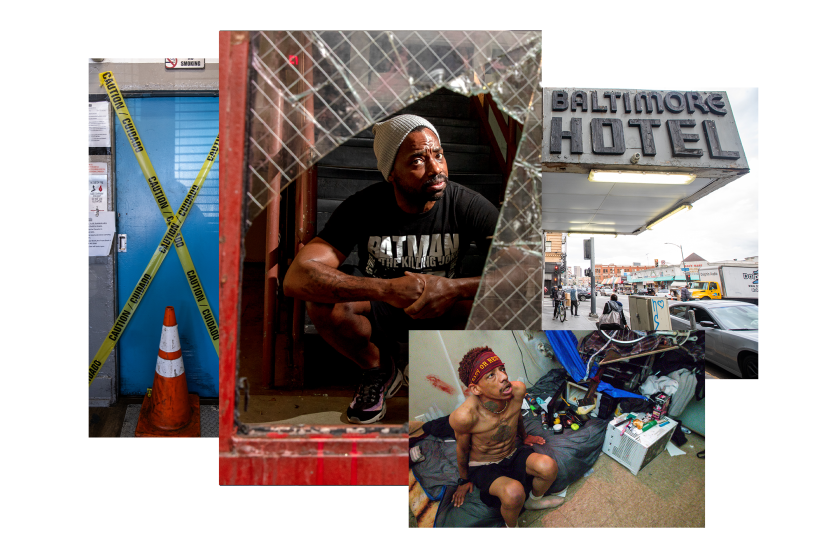Why Leo Pustilnikov is buying 1,500 Skid Row apartments and wants to build thousands more
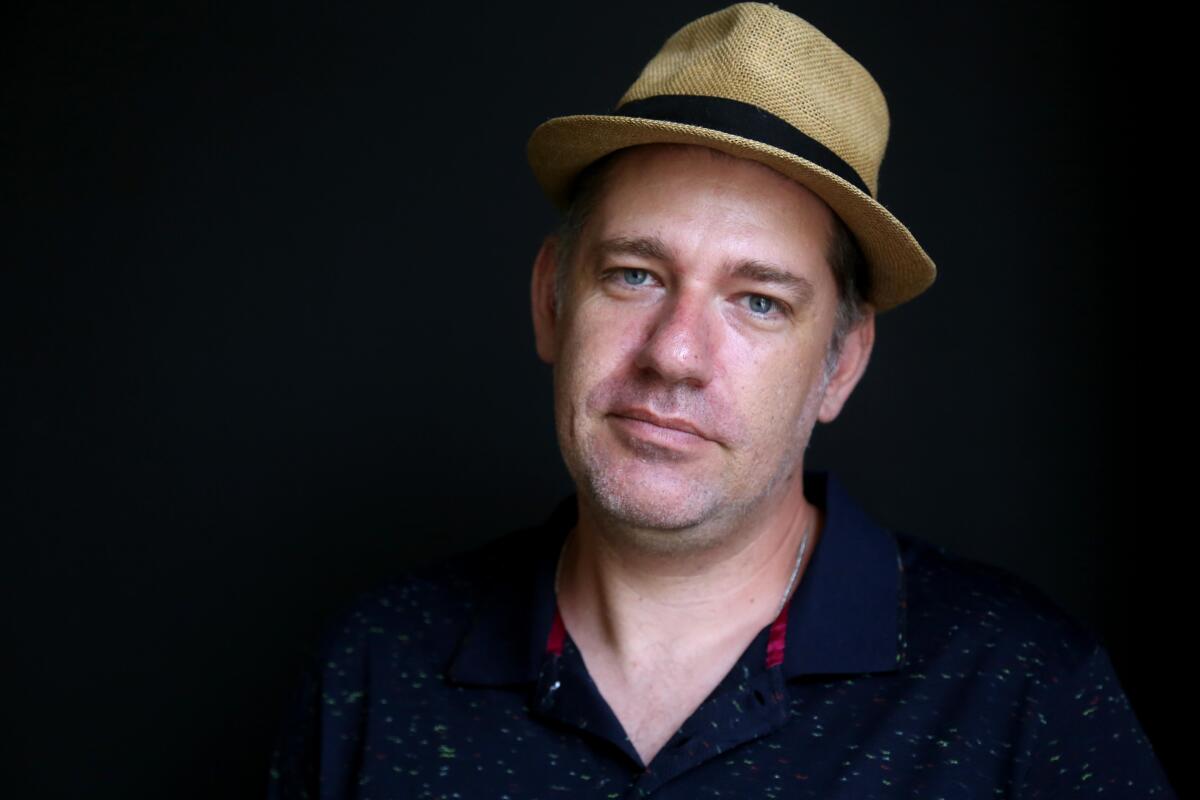
- Share via
The first time Leo Pustilnikov tried to create a downtown Los Angeles real estate empire his effort ended in allegations of fraud and betrayal.
In 2011, Pustilnikov and two wealthy investors were negotiating deals for a half-dozen aging buildings to build a portfolio that they believed would top $100 million.
Then, less than a year later, the deals fell through and the partnership spiraled into bitter litigation.
“On many occasions you mentioned to me that you don’t have a problem stepping on peoples toes,” wrote Izek Shomof, one of the investors, in an email to Pustilnikov at the time. “(I)n the past i told you it was a very bad thing to say or do because when you step on peoples toes it hurts. Maybe you don’t care if it hurts, but in life, what goes around comes around.”
Now, Pustilnikov, who has since amassed an assortment of high-value properties from Beverly Hills to Redondo Beach, is trying again downtown. The centerpiece of his plan is 17 buildings remaining in receivership after last year’s collapse of the nonprofit Skid Row Housing Trust. At 1,200 units, the trust portfolio is one of the largest collections of supportive housing in Los Angeles, with many of the buildings’ formerly homeless tenants suffering from drug addiction and mental health problems.
The AIDS Healthcare Foundation abandoned its bid to buy six failing Skid Row buildings. The decision might leave the city on the hook for more funding.
As future owner, Pustilnikov, 38, says he plans to meet the overwhelming need in Skid Row by filling the hundreds of vacancies in the trust buildings. He has agreed to pay $10 million for the portfolio, and the court-ordered receiver is expected to seek judicial approval for the deal this month.
Details from Pustilnikov’s earlier venture, including those revealed in sworn testimony and thousands of private emails and other documents from the litigation, raise concerns about his oversight of housing for poor and vulnerable tenants.
During negotiations to purchase a low-income building in 2012, Pustilnikov helped try to inflate its price in pursuit of a higher federally backed loan, according to claims made in emails and sworn statements from the litigation. That deal fell through before a loan application was filed. And while Pustilnikov and the other investors squabbled, their three single-room occupancy hotels in Skid Row sat nearly empty, even as people lived on the streets nearby.
In the years since, Pustilnikov has alternated between supporting low-income housing and fighting efforts to provide it.
He’s pioneered a novel interpretation of state law to propose thousands of new apartments in some of Southern California’s richest communities. He also supported a lawsuit in 2021 that aimed to preserve a parking garage near his commercial property in Santa Monica, arguing that it was more important than the homeless housing the city wanted developed there.
Pustilnikov said he’s well-positioned to help solve the homelessness crisis, arguing that his experience downtown is an asset, and that he’s learned to handle the complexities of a difficult tenant population, aging facilities and web of government subsidies required to keep the buildings afloat. He’s stepping in to rescue the trust’s remaining properties when the region’s established nonprofit landlords have shunned them.
“It’s something that L.A. needs,” Pustilnikov said in an interview with The Times.
Representatives for Mayor Karen Bass and Receivership Specialists, which is currently overseeing the trust portfolio, declined to comment on their vetting of Pustilnikov. A mayoral spokesperson said that any future operator of the trust buildings must offer on-site supportive services to tenants and maintain the properties as affordable housing — terms Pustilnikov has agreed to — and that a judge ultimately will decide the portfolio’s fate. An official with the receivership said the firm felt confident that the prospective owner would be “suitable” for the properties.
::
Thirteen years ago, Pustilnikov began working for real estate investor Naty Saidoff, whose company owned thousands of apartments in California and Texas, serving as chief negotiator for his boss’ entrance into the downtown market. They ran into Shomof, who was known as “The King of Spring” for his redevelopment projects on the busy street in the historic core. The trio decided to work together.
One building central in their plans was Hayward Manor Apartments, a 525-unit SRO hotel reserved for low-income residents at 6th and Spring streets.
In March 2012, Shomof agreed to sell the Hayward to Saidoff for $44 million, according to a sworn statement from Shomof in the litigation.
Saidoff wanted to secure $40 million in low-interest financing from the federal Department of Housing and Urban Development, records from the litigation show. But at the time, HUD rules allowed a maximum $37.4-million loan for a $44-million property.
So Saidoff and Pustilnikov drew up a purchase and sale agreement for the Hayward that listed the price as $47.5 million, an amount that would just clear the HUD threshold for Saidoff’s plan.
“The purchase price was for $47.5 [million] even though the effective purchase price was supposed to be $44 [million] and so we needed to secure the $3.5 million that would be refunded to us,” Pustilnikov testified at trial.
Pustilnikov wrote a separate document detailing what he and Saidoff called a “finder’s fee” for that amount that Shomof would pay to Saidoff’s aunt.
Shomof said in sworn testimony that Saidoff’s aunt had nothing to do with the transaction and the finder’s fee was a sham for Saidoff to get more money from HUD.
Testifying in the civil trial, Saidoff conceded that the purpose of the $3.5-million payment to his aunt was to secure a larger HUD loan. He added that doing so was Pustilnikov’s idea.
Pustilnikov, for his part, put the onus for the plan on Saidoff.
“Naty sought to circumvent HUD regulations on the Hayward,” Pustilnikov wrote in an email to Saidoff’s attorney in the weeks before the trial.
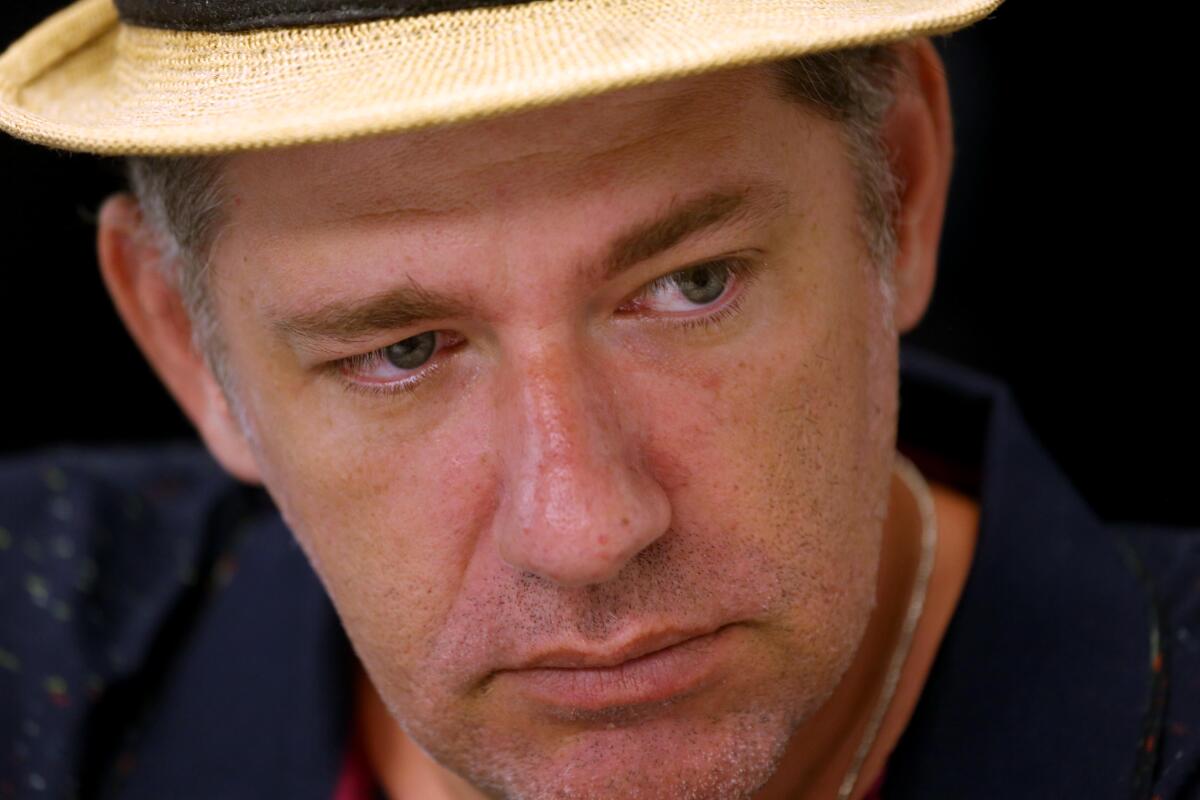
Though Shomof signed the purchase and finder’s fee agreements, Pustilnikov and Saidoff never submitted a loan application for the Hayward and the deal did not close. The signed agreements show an intent to inflate the building’s price so the pair could secure a larger, taxpayer-backed loan, said Kelly Boyer, who oversaw multifamily housing finance in Los Angeles for HUD at the time and reviewed the court documents and testimony at The Times’ request.
“It seemed to be very well thought out,” said Boyer, who now works as president of Rose Community Capital, a private lending firm.
Boyer said if Pustilnikov and Saidoff had followed through with a loan application containing those details of the transaction at the time, she would have considered referring the matter for a criminal investigation.
In the Times interview, Pustilnikov adamantly denied that he made the Hayward pricing decision and instead said his role was limited to following his boss’ orders. Pustilnikov, who was in his mid-20s at the time, said he was still learning the real estate business and the incident was among ethical concerns that led him to quit working for Saidoff.
“There were no shortage of things I was exposed to that were poisonous for the soul,” Pustilnikov said.
Saidoff declined to answer questions about the Hayward deal and Pustilnikov, saying he’d signed confidentiality agreements. He emphasized that he’d never actually applied for HUD financing for the building.
Disputes over the Hayward in spring 2012 contributed to the souring of the relationship among the three investors. In early 2013, around the time Pustilnikov quit, Shomof sued Saidoff, accusing him of breaching a verbal agreement to partner equally with him on their projects.
Then Pustilnikov switched sides.
With Shomof, Pustilnikov helped put together deals to purchase the Alexandria, the once-luxury hotel on Spring Street that had been turned into low-income housing, and the nine-acre property of the iconic Sears building in Boyle Heights. Pustilnikov received ownership stakes in both. Pustilnikov also testified in support of his new partner in the litigation against his former boss. In December 2014, a jury awarded Shomof a $13.6-million judgment. Shortly after, the case settled and the verdict was set aside, court records show.
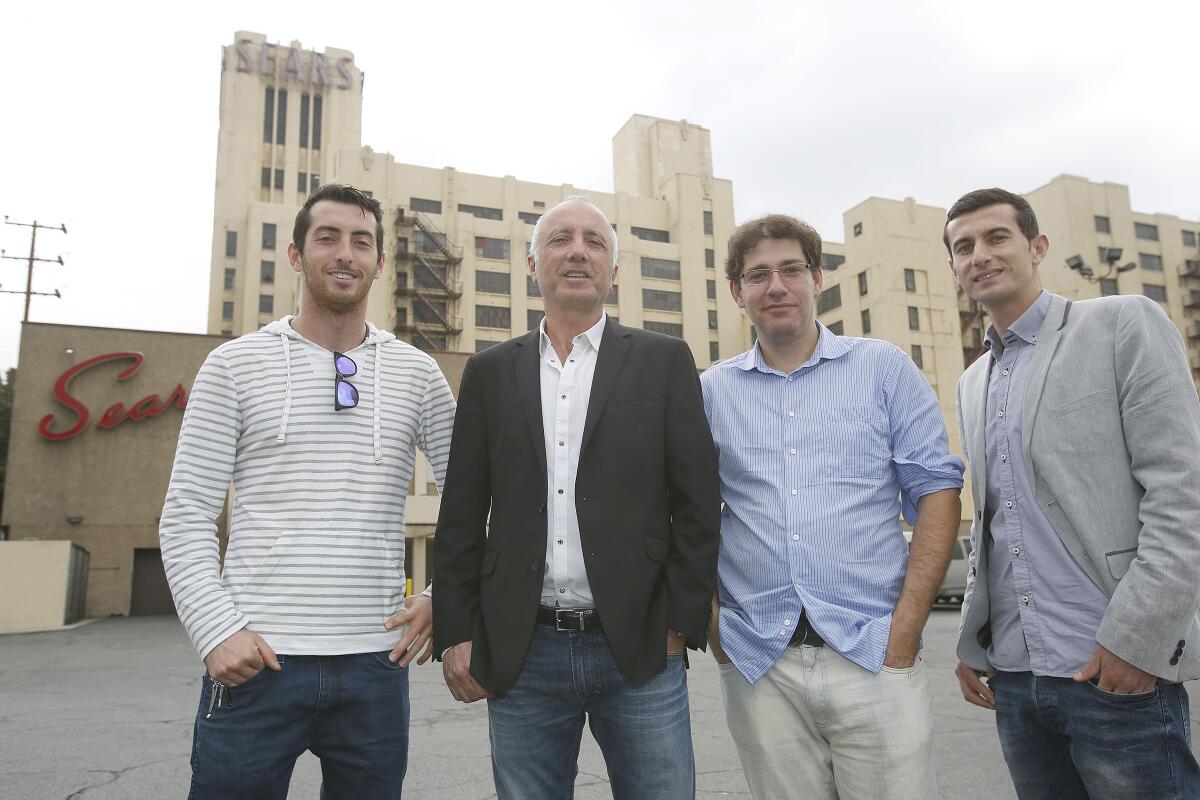
In 2016, Pustilnikov bought three old SROs along 5th Street in Skid Row that Shomof and Saidoff had purchased together nearly five years prior.
Within two years, Pustilnikov sold the Baltimore and King Edward hotels to the AIDS Healthcare Foundation, and he did the same with the Leland in 2022, property records show.
The SROs, which served as last-resort housing for otherwise homeless Skid Row residents, had continued to languish while they were under the three investors’ control. When the AIDS charity took over, three-quarters of the roughly 400 units in the buildings were vacant, foundation general counsel Tom Myers previously told The Times. Under its ownership, the foundation has nearly quadrupled occupancy, Myers said.
Still, the foundation has struggled itself to operate the buildings in part because of their aging plumbing, heating and other infrastructure.
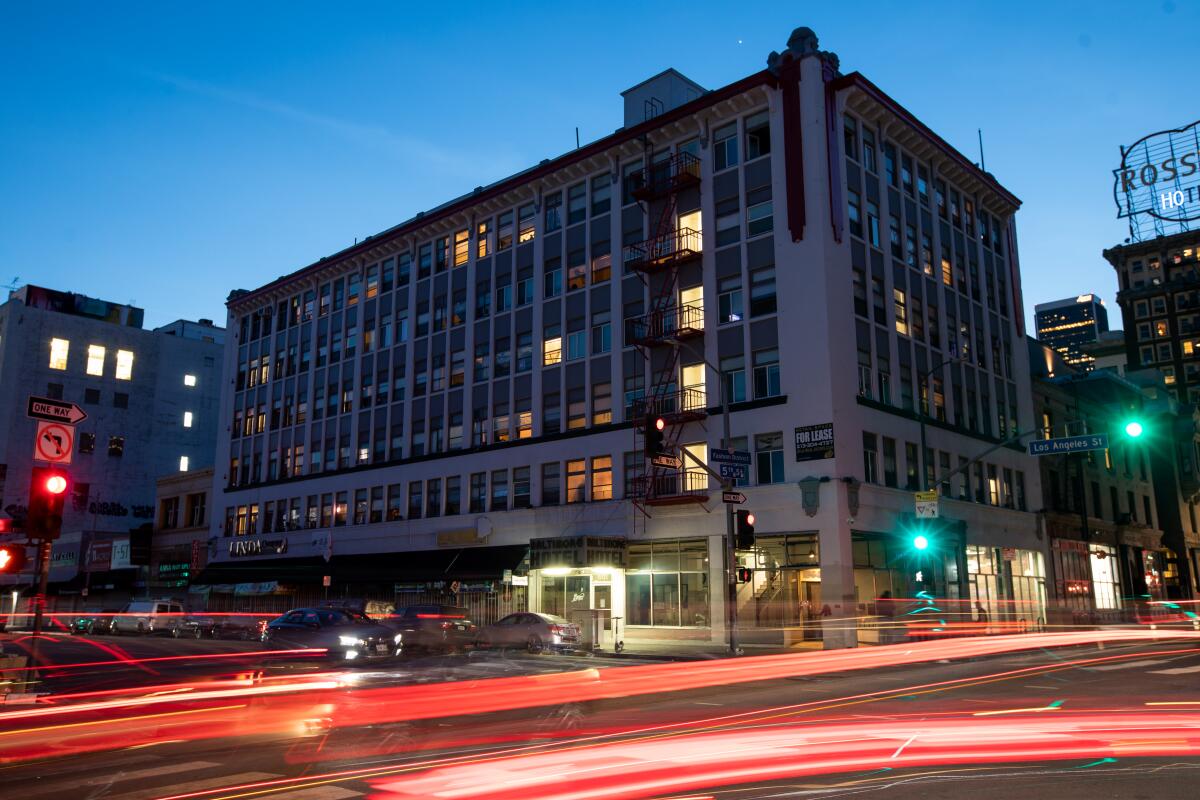
Pustilnikov said he’d completed major upgrades to the King Edward, including renovating its elevator, and was putting together financing to rehabilitate the other SROs when the foundation’s offers came along.
“We spent years and millions of dollars in getting plans to do the project,” he said.
Pustilnikov acknowledged that he made a profit when he sold the buildings to the foundation for $43 million — $10 million more than he’d paid.
::
During 15 months in receivership, the Skid Row Housing Trust portfolio has been dismantled. Eleven properties, mostly those newer and in better condition, already have been transferred to traditional nonprofit owners.
But no nonprofits have been willing to take on the remaining 18 buildings, many of which require extensive repairs and lose money despite federal rent subsidies. Pustilnikov is in line to acquire 17 of them with a separate buyer in negotiations for the final property.
Recently, The Times has been investigating Skid Row’s troubled housing providers, digging into the failures of nonprofits such as AIDS Healthcare Foundation.
Pustilnikov plans to partner with a nonprofit, San Fernando Valley-based Hope the Mission, to supervise the buildings’ social services, which are seen as essential to house tenants with addiction or mental health issues. Pustilnikov and the same nonprofit are finalizing the purchase of the Rosslyn Lofts, a 300-unit building near Skid Row, out of a separate receivership and Pustilnikov said he’s considering buying more in the neighborhood.
The closest analogue to the trust buildings in Pustilnikov’s existing portfolio is the Alexandria, the 1906 historic hotel converted into 463 units of low-income housing. Pustilnikov continues to own a minority share alongside Shomof.
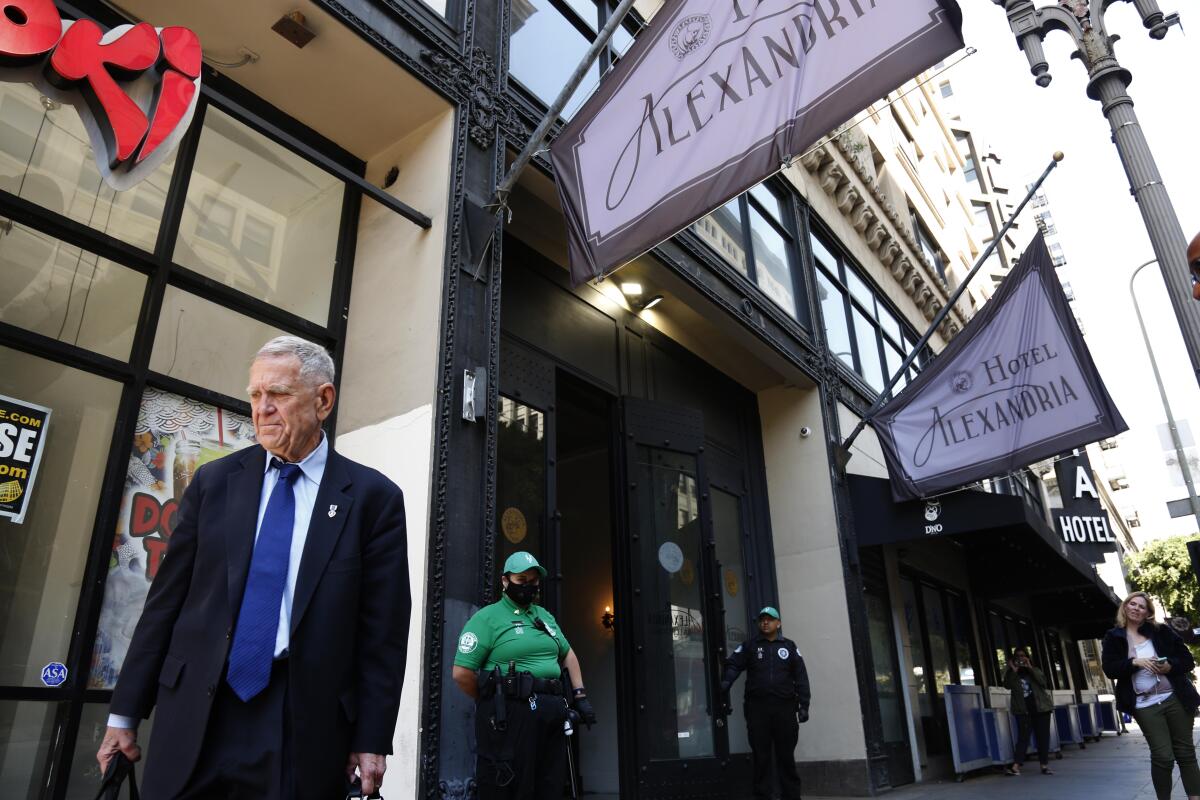
In 2021, the Alexandria’s owners sued the property management firm they’d hired, alleging that for years the firm was stealing rent money, shirking repairs and allowing non-residents to squat in the building. They fired the firm, Barker Management, shortly before filing the lawsuit, which remains pending. Barker Management officials deny the allegations, an attorney for the company told The Times.
As junior partner, Pustilnikov said he was unaware of the lawsuit until after it was filed. He said his efforts at the Alexandria were most significant in the year after he and Shomof bought the building, and that it’s in much better condition than before they took over. A Skid Row service provider had given Shomof and Pustilnikov an award for their work in 2015.
“In terms of transitioning and righting the ship, I’m very involved,” Pustilnikov said.
Shomof confirmed to The Times that Pustilnikov is not engaged in day-to-day operations of the Alexandria and said that the building has improved since changing management firms.
Since his dealings downtown more than a decade ago, Pustilnikov has expanded his holdings across Southern California.
Bill Brand, the mayor of Redondo Beach, has amassed power on a slow-growth platform. Now, a series of emails involving him and supporters are heightening criticism about their tactics.
He’s taken advantage of a new strategy, known as “the builder’s remedy,” aimed at forcing cities to accept projects that otherwise never would have a chance at approval.
Through a series of recently strengthened state laws, developers can propose to build whatever they want in cities without state-approved housing blueprints so long as they set aside part of the project for low-income residents.
Pustilnikov has submitted plans for a 2,700-unit project on the Redondo Beach waterfront, a 19-story tower in Beverly Hills, blocks from the Waldorf Astoria and Peninsula hotels and 10 more builder’s remedy developments in the two cities, Santa Monica and West Hollywood.
All told, Pustilnikov wants to build 3,500 units, including 700 for low-income residents.

Three years ago, Pustilnikov, alongside other Santa Monica business owners, tried to stop the demolition of a parking garage near the Third Street Promenade that the city intended to turn into homeless housing. Pustilnikov is part owner of a movie theater and food hall on the Promenade.
Santa Monica leaders argued that the garage, known as Parking Structure 3, was seismically unsafe and underused. As many as 196 apartments for formerly homeless and low-income residents could be built there, according to city planning documents.
The business group filed an environmental lawsuit — a tactic Pustilnikov has decried when used against his projects — to try to preserve the garage, whose parking spaces Pustilnikov said were vital for the commercial strip.
“The idea was not to oppose affordable housing,” he said. “The idea was to keep [or] replace the parking that was lost.”
A Los Angeles County Superior Court judge tossed the case in early 2022. The garage has since been bulldozed and the housing plans are moving forward.
Times staff writer Doug Smith contributed to this report.
More to Read
Sign up for This Evening's Big Stories
Catch up on the day with the 7 biggest L.A. Times stories in your inbox every weekday evening.
You may occasionally receive promotional content from the Los Angeles Times.


